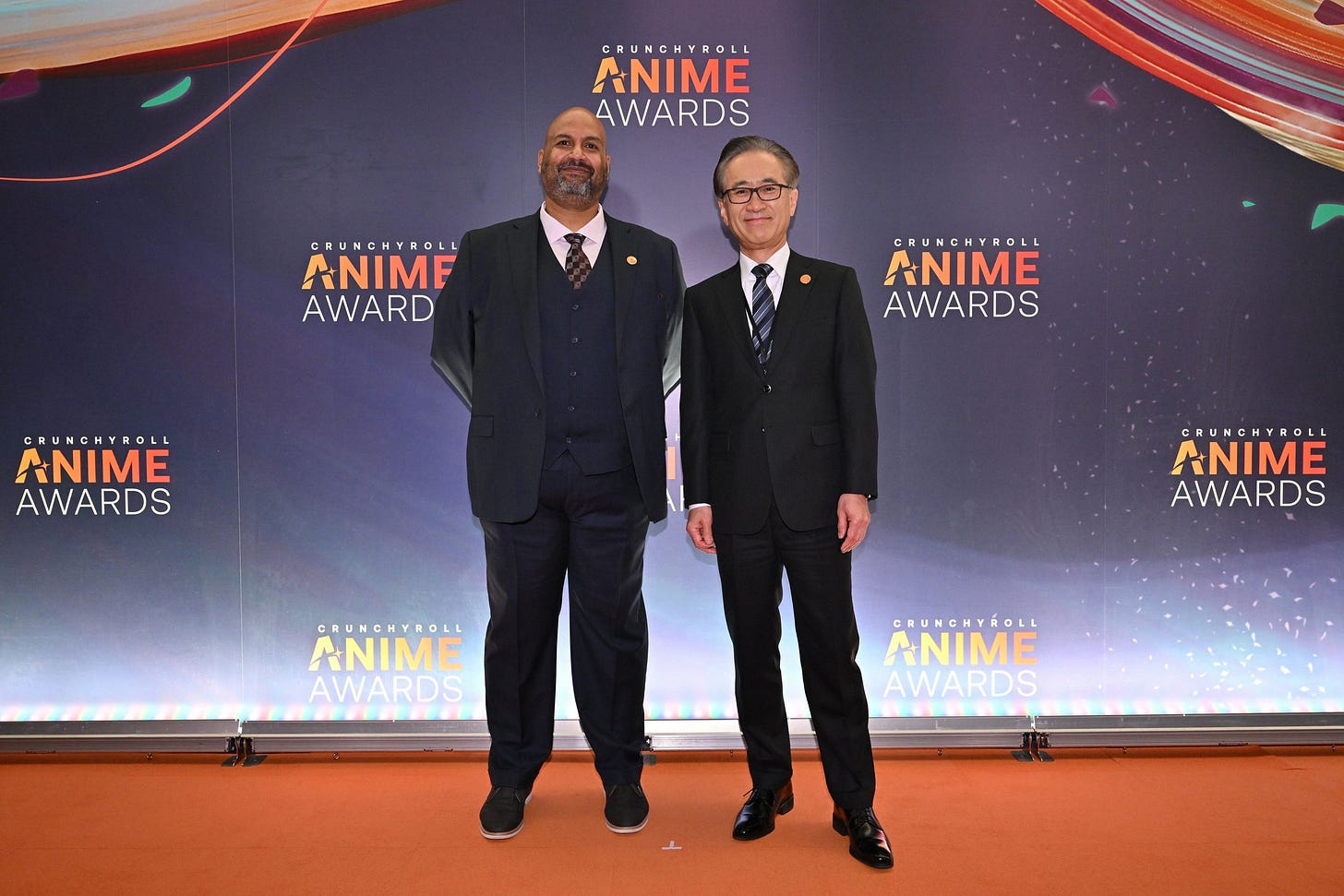Sony builds an empire in the anime industry
Plus: Studio Ghibli's surprising (lack of) marketing for Miyazaki film; Anime theme song tops Billboard global music chart; New technologies in digital manga; and more
This is your weekly Animenomics briefing, covering the business of anime and manga. Today is Wednesday, June 7, 2023.
In case you missed it: Anime Expo, the largest anime convention in North America, has released its 2023 schedule. The event runs July 1–4 in Los Angeles.
Sony casts the specter of a monopoly in anime industry

At its recent annual business segment meeting, the Sony Group did not shy away from presenting its ambitions in anime. The group’s overwhelming reach in the industry is raising concerns about a potential monopoly, reports the Weekly Toyo Keizai business and finance magazine.
Why it matters: Sony’s strength comes from control of two companies that are important players in the anime value chain—Aniplex, which handles planning and production, and Crunchyroll, which handles international distribution.
Aniplex operates top-tiered anime studios A-1 Pictures and CloverWorks, whose recent hits are Lycoris Recoil and Bocchi the Rock!, respectively.
Crunchyroll, whose brand was integrated with Funimation in 2021, now has 11 million paid subscribers, months after crossing 10 million.
Behind the scenes: Although the two companies operate under different Sony divisions, they maintain a close partnership when working on anime productions.
Industry executives interviewed by Toyo Keizai say Aniplex’s desire to create hit titles is on a scale not seen in other producers. There is a strong emphasis on maximizing profits, and its planning and sales capabilities are unmatched.
Aniplex also maintains deep connections with external companies, such as Ufotable, which animated Demon Slayer. One executive says Ufotable would reject their producer’s business proposals while accepting ones from Aniplex.
Aniplex relies on Crunchyroll to expand the global reach of its intellectual properties, though a Goldman Sachs analyst says Sony has stopped short of making Aniplex titles exclusive to Crunchyroll’s streaming platform.
The other side: Shueisha, the manga publisher of Demon Slayer, has been a close partner of Aniplex for years, but it is diversifying to other distribution channels.
Shueisha founded the anime distribution company REMOW in 2021 with a consortium of smaller investors. Several Shueisha executives sit on its board.
Notably absent from REMOW’s list of investors are Sony Group companies, though REMOW tells Toyo Keizai it is not seeking distribution agreements that exclude Crunchyroll.
“Sony is too powerful. A monopoly is something to be feared,” says one Shueisha executive.
New Miyazaki film will not be marketed before release

With just one month to go to the July 14 theatrical release of How Do You Live?, avid followers of director Hayao Miyazaki’s animation career are being left in the dark about details of his new work.
Driving the story: Studio Ghibli president Toshio Suzuki recently told Manabu Shintani, the editor-in-chief of Bungeishunju magazine, that the company has no plans to market the film beyond the already-released promotional poster.
As reported by Animenomics in April, Cannes director Thierry Frémaux had also unsuccessfully lobbied for the film to make its debut at the festival.
What they’re saying: Suzuki believes viewers actually prefer this approach over one with trailers that give away too much information and deprive audiences of the joy of discovering a movie.
He made the decision to skip any trailers and advertisements after Miyazaki praised the promotional poster as the best one yet of any Studio Ghibli film.
Yes, but: Shintani, like many, is not entirely sure what to make of the poster. While probing for more information, Suzuki surprised him further by saying that the movie has nothing in common with the 1937 Genzaburo Yoshino novel beyond the identical titles.
Between the lines: Suzuki also clearly told Shintani that Studio Ghibli decided not to create a production committee to fund the film. Without outside investors in the project, an extensive marketing campaign would be costly and difficult for the company to organize alone.
Production committees have funded every Studio Ghibli film since Nausicaä of the Valley of the Wind in 1984, helping popularize the system throughout the anime industry.
In 2020, Suzuki told attendees of a Ghibli Museum promotional event that he convinced Miyazaki to agree to a Netflix distribution deal in order to help fund production of How Do You Live?.
Clippings: YOASOBI tops Billboard global music chart
Musical duo YOASOBI’s single “Idol”, used as the anime opening theme song of Oshi no Ko, is the first song originally performed in Japanese to top the Billboard Global music chart outside the United States. (Billboard)
Japan’s largest manga piracy website has shut down after Shueisha subpoenaed Cloudflare for information on the website operator under the Digital Millennium Copyright Act. (TorrentFreak)
Anime production company TMS Entertainment is organizing its first manga competition to promote creation of new intellectual properties. The grand prize is ¥3 million (US$21,500) and a manga serialization contract. (Press release)
Tokyo’s twice-yearly Comic Market, the world’s largest fair for independently-published art and manga also known as Comiket, will be held this summer without any COVID-19 restrictions. (NTV News)
Crunchyroll sees a growth opportunity in anime films
“We’ve found that these theatrical exhibitions of anime films are terrific and very profitable for us, so that will be another area of great interest.”
— Sony Pictures Entertainment CEO Tony Vinciquerra on Crunchyroll’s film business
Context: Responding to a question from Goldman Sachs on Crunchyroll’s growth strategy, Vinciquerra put a rare spotlight on Crunchyroll Films during Sony’s recent business segment meeting. This division distributed Suzume outside Asia and also Demon Slayer: Mugen Train and Dragon Ball Super: Super Hero.
Japanese e-publishing group honors innovative tech

A webtoon platform and a digital illustration tool popular among animators and manga artists are among a list of innovative technologies that will be honored by the Association of E-publishing Business Solutions in its annual award ceremony.
Why it matters: Japan is one of the world’s largest publishing markets. While it has a reputation for a strong print publishing sector, digital publications took up almost one-third of the market share last year.
The winners: Clip Studio Paint, the painting software with more than 30 million users and utilized in the workflow of anime studios such as Nippon Animation, is one of four winners of the Special Prize.
Another prizewinner is the full-color, vertical-scrolling webtoon platform Tatesc Comics, which launched in 2021. Developed by Kadokawa, its titles have also been released in English on the publisher’s BookWalker platform.
The Grand Prize winner is MDAM, a digital asset management platform for magazine production that was developed by Shueisha. It allows publishing partners access to a central repository of digital files for reuse.
Past winners: Manga-related technologies and services have been represented in nearly every award ceremony since 2018.
Last year, the Grand Prize went to Link-U, a technology company that built the manga apps Manga One (operated by Shogakukan), Zebrack (Shueisha), and Manga Up! (Square Enix).
Thanks for reading this week’s newsletter. Do you know a friend who watches anime and reads manga? Consider sending them newsletter so they can learn more about how their favorite titles are made behind the scenes.


